
During the protests in Ferguson, one of the key voices calling for justice is Missouri State Senator Maria Chappelle-Nadal. She has been in the streets facing tear gas, and on Twitter, where she was highly critical of Gov. Jay Nixon’s lack of action days after Michael Brown was killed by police and protests erupted. “The fact that [Gov. Nixon] still has not come to talk to the people who see themselves as Michael Brown at any given time is really a slap in their face,” Chappelle-Nadal says. “He only comes around the minority community when it’s politically expedient.”
Transcript
AMY GOODMAN: We turn right now to a Missouri state senator. During the protests here in Ferguson, one of the key voices calling for justice is Missouri State Senator Maria Chappelle-Nadal. She has been in the streets facing tear gas and on Twitter, where she was highly critical of Governor Jay Nixon’s lack of action days after Michael Brown was killed and protests erupted.
Senator Chappelle-Nadal, we welcome you to Democracy Now!
SEN. MARIA CHAPPELLE-NADAL: Thank you so much for having me today.
AMY GOODMAN: Thank you so much for joining us. Am I pronouncing your name correctly?
SEN. MARIA CHAPPELLE-NADAL: Absolutely.
AMY GOODMAN: Talk about what’s happening here in your city. You have been here from day one. A very controversial tweet you sent out, angry at Governor Nixon, saying, “F— you, Governor Nixon.” Why?
SEN. MARIA CHAPPELLE-NADAL: Yes. Well, let me tell you. I was here since day one. It was a Saturday, late evening. And a good friend of mine, Antonio French, said, “Hey, listen, we’ve got to get out here. You have to be out here.” And I came up, and I noticed a lot of people very angry about a young man laying dead on the ground for hours, literally for hours. And so, since that point in time, I was protesting with the people.
There’s a lot of anger in this community, many people who have been intimidated, harassed by authority, such as police officers, and they felt as though—and they feel as though they are Michael Brown themselves. And so, at any given time, wrong place, wrong time, they are Michael Brown. And so, unfortunately, the Sunday after the killing of Michael Brown, there was a lot of looting, unfortunately. And on Monday, after the looting, we were protesting in peace, and we were tear-gassed. We were given no warning. In fact, I just did a different interview, and it was said that there have always been at least 30 or 40 minutes prior to tear-gassing, but not the first three days of tear-gassing. We didn’t know that.
And so, where I was, it was a one-way street, one way in, one way out. I had my intern and a young reverend with me, and we were trying to get out of the area. At that time, there was a woman, six months pregnant, who was forced to the ground, face down, because she was trying to get out of the street, which is a one-way street. And they thought of her as a threat. It felt as though we were being threatened or accused for being looters, and we weren’t. I was with about 150 kids, young people who live in the apartment buildings right on Northwinds Estates, right behind the QT. And if I felt unsafe, I wouldn’t have been there. We had no opportunity to leave. I was scared. I was nervous. I’m pretty courageous. I’m a pretty courageous person, and I was nervous. I was nervous for my intern, because she’s only 21 years old.
And the governor, Wednesday, he was still at the State’s Fair. He was at a country music concert when his own Democratic senator was getting tear-gassed. And he had not even been engaged in the situation whatsoever. So, yes, I was very mad. And anyone—people keep asking me if I regret what I said. And I don’t, not whatsoever. One, it’s my First Amendment right to say whatever the heck I want to say, any four-letter word, expletive. And I think anyone who has been tear-gassed, it would be abnormal if they did not express themselves. So, absolutely, I was upset.
The most important thing your audience should know is that the governor still has not gone to ground zero. We are in day 11 or 12 now, and he’s been to the municipalities, both north and south, and here at the command center, which is about a mile south, southeast of the ground zero number one—because we have two ground zeros. And he has yet to come to talk to the people. I’ve been out on the ground since 6:00 this morning. And I was talking to one of my constituents this morning, and he said, “I don’t know what is going on with the governor, but we would have protected him. He didn’t have to come in the evening time, where there are a lot [inaudible] have come in the morning, where there are fewer people.” But the fact that he still has not come to talk to the people, who see themselves as Michael Brown at any given time, is really a slap in their face.
And that’s why I’m bringing into question, you know, what his intent has been all along. And I have said publicly that he’s always felt uncomfortable within the minority community. He only comes around the minority community when it’s politically expedient. A great example, last year he tried to cut TANF benefits, which would disproportionately impact minority communities. He also wants to cut low-income housing and tax credit benefits, which again would disproportionately impact minority communities. So, this governor, for his entire career, political career, he’s had a disconnect and not a true, genuine relationship with the African-American community, unless it’s politically expedient for the next promotion he may get.
AMY GOODMAN: Attorney General Eric Holder is coming to town today. Have you been in communication with him? Are you going to be meeting with him today?
SEN. MARIA CHAPPELLE-NADAL: Well, I hope to meet with him. I know that he has a really congested schedule. I have sent a letter not only to Valerie Jarrett in the White House to really make sure that the National Guard stays in place. As it relates to Eric Holder, I sent—we’ve called the office. He’s trying to make some room. If that happens, I don’t know. But I really want to talk to him, because unlike the governor and unlike my congressman, I have been on the ground every single day with the people of this community who are most impacted by the death of Michael Brown Jr.
AMY GOODMAN: Your view of what exactly President Obama should be doing right now?
SEN. MARIA CHAPPELLE-NADAL: Well, there are a lot of mixed feelings out there. And just the fact that he came home early from a vacation is really good. I think he’s had a very measured approach in this. He’s trying to stay as balanced as possible. I do think that Eric Holder understands that our civil rights have been violated. As protesters, we experience excessive force from the St. Louis County police officers and the Ferguson Police Department. And we were prohibited from expressing—as a senator, I was prohibited from expressing my First Amendment right, along with 150 other young people. And so, that right was taken away.
The next thing that was, in my belief—I’m not an attorney, but I do believe that when it came to Michael Brown, no matter if he did something wrong or not, if he was accused of theft, he has due process. Right now, Darren Wilson, he gets to benefit from due process. No one appointed or elected Officer Wilson as the judge, jury and executioner.
AMY GOODMAN: Why hasn’t the officer been indicted? We’ve had other people saying that the prosecutor actually does not have to impanel a grand jury. If you could talk about Bob McCulloch and his role in everything that has happened?
SEN. MARIA CHAPPELLE-NADAL: Well, I have to start off by saying that there’s a great mistrust of Bob McCulloch in this community, the black community. A lot of people think that he’s biased because of his own personal experience with his father being killed by an African American, the number of convictions he’s had. The majority of them have been African-American. This is an emergency. We are in an emergency state right now. And I think taking things per usual is not due diligence whatsoever for this community. I mean, the world is looking at St. Louis right now. And he said that the grand jury meets every single week. You know, we should have received justice last week.
But here’s the other deal. You know, my community, the young people that I talk to, they say two things. They say, number one, if they killed someone, as an African American, they would have been in jail immediately. There wouldn’t be any question whatsoever. They wouldn’t be sitting at home watching TV like Officer Darren Wilson is right now. Because they are African-American, they feel as though there’s a double standard. And Darren Wilson should be arrested just like an African American would be arrested in a situation like this.
But the next thing that my constituents say is that if—two more things. One, because there’s so much anger and there’s so much hate, a lot of the young men, they’re willing to die for justice. And what I’m trying to do on the ground is redirect all of that anger, which is so intense, and redirect it to outcomes and action, like going to your City Council meetings and knowing who your councilmembers are, knowing the name of your mayor. I’m trying to redirect that. On Sunday, right after the killing of Michael Brown Jr., I was between police officers and people who were willing to die. And I had to hold—it’s the first time I learned that a touch of a woman can really impact a very angry man. I never experienced that before, but for that Sunday afterwards.
And still, two days ago, I had a man, who has a cane, who was crying. He was crying. I mean, if you understood—I never thought that I would be just so adamant about the First Amendment. But when that very foundation, the most important right that any of us have, is taken away, I mean, my constituents are so hurt, because they can’t express themselves. To have my First Amendment right taken away as a senator, I couldn’t believe it. So I had to hold this man, a grown man crying, because he felt as though his First Amendment right was being taken away from him, and he didn’t understand why he was being treated differently from everyone else. And so, I mean, there’s a lot of frustration.
And going back to the governor, he doesn’t get to feel this at all. He doesn’t get to see this. He doesn’t get to hear these stories, because he has refused, at the 11th, 12th day now, to go to the ground—to go to ground zero and talk to the people who are hurting.
AMY GOODMAN: School is supposed to start. Has it started? We interviewed Dr. Art McCoy, who used to be the superintendent.
SEN. MARIA CHAPPELLE-NADAL: Yes, yes.
AMY GOODMAN: The first African-American superintendent of the schools.
SEN. MARIA CHAPPELLE-NADAL: Yes, yes, yes.
AMY GOODMAN: But what happened to him?
SEN. MARIA CHAPPELLE-NADAL: Well, let me tell you. A all-white school board, six of the seven decided to intimidate him. And he ended up—I mean, he’s a minister, and he is one of the most intelligent people that I have ever met. And I would absolutely do anything for him. But unfortunately, because of the—I would say, the institutional racism we have within this community, they didn’t want him. They were mad at him. And they were doing whatever it took to get him away from this district. And it’s unfortunate. I think what happened to him is very insightful as to what is going on in the police department in Ferguson right now. It’s kind of the same thing.
AMY GOODMAN: It was an all-white school board—
SEN. MARIA CHAPPELLE-NADAL: Yeah.
AMY GOODMAN: —that ultimately pushed him out, six of the seven.
SEN. MARIA CHAPPELLE-NADAL: Yeah.
AMY GOODMAN: And then you have a City Council here that—
SEN. MARIA CHAPPELLE-NADAL: Yeah, there’s only one African American, Dwayne James, who is awesome, who’s been at ground zero several times and trying to come up with solutions. But, you know, I haven’t seen any of the other councilmembers. The mayor of Ferguson, I’ve only seen him on the ground a couple of times. He is a friend. But people need to be touched and heard. They need to know that someone’s listening.
AMY GOODMAN: Last words to the people of the world who are watching, listening and will be reading your words today?
SEN. MARIA CHAPPELLE-NADAL: Please know that Ferguson, Missouri, is a peaceful place. This is the first murder this year. There’s a lot of institutional racism, and it’s come to a head now. And thankfully, the world does know. Unfortunately, we shouldn’t have lost a young man. And we are going to rebuild. And our businesses are supportive, even though some of them have been looted. But they’re very supportive, and they understand. And this is a multiracial movement to make sure that young people aren’t intimidated and harassed. So, we’re going to move on. But thankfully, you know—how do you say it—the covers are now lifted, and all of the light is shining, and so people know what’s going on.
AMY GOODMAN: Well, I want to thank you very much for being with us. I want to thank our guest, Maria Chappelle-Nadal, Missouri state senator.

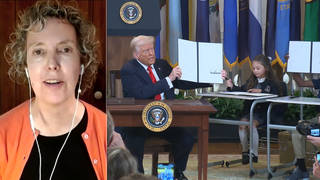
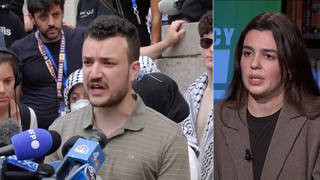
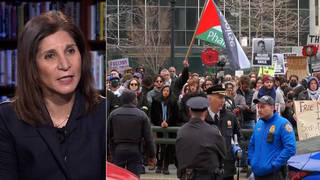
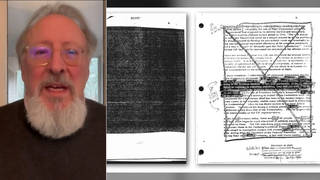





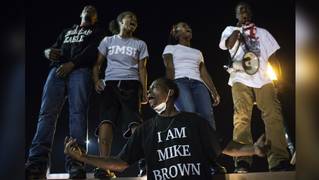
Media Options